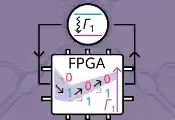Intel Releases Intel Quantum Software Development Kit 1.1 with Open Source Compiler Front End
March 05, 2024 -- With the release of version 1.1 of the Intel Quantum Software Development Kit (SDK) on the Intel® Developer Cloud or qBraid, developers now have more options to use this full quantum computer in simulation, including the Intel® Quantum Compiler, Quantum Runtime and simulation of quantum hardware. Intel Quantum SDK 1.1 expands the capabilities of the high-level programming environment with new features, including an open source compiler front end, new target qubit simulator back ends and customizable qubit noise models, as well as more powerful programming tools for coding in familiar patterns.
As a full quantum computer in simulation, the Intel Quantum SDK will eventually serve as the interface to Intel’s quantum hardware, including Intel’s Horse Ridge II control chip and Intel’s Tunnel Falls quantum dot spin qubit research chip. The kit allows developers to program quantum algorithms in simulation, and it features an intuitive programming interface written in C++ using an industry standard LLVM compiler toolchain. As a result, Intel’s SDK offers seamless interfacing with C/C++ and Python applications, making it more versatile and customizable.
“The added features in version 1.1 continue Intel’s efforts to make quantum computing intuitive and accessible to more developers,” said Anne Matsuura, director of Quantum Applications and Architecture at Intel Labs. “Since the Intel Quantum SDK beta version and version 1.0 were initially released in 2022, Intel is seeing positive results from many users. Intel is also taking a leadership role in efforts to expand the quantum ecosystem, including the establishment of Intel-funded quantum educational programs and Intel Quantum SDK competitions.
New Intel Quantum SDK 1.1 Features
The Intel Quantum SDK 1.1 added the following features to assist developers:
Open source compiler front end: The Intel Quantum SDK now offers an open source quantum compiler front end to allow developers from the quantum community to contribute compiler passes to optimize algorithms. This also gives developers access to target the industry standard LLVM intermediate representation interface between the front and back end with a compiler front end of their choice.
Two new target qubit simulator back ends: Developers now have two more simulator back ends from which to choose. The first back end is a tensor network back end capable of optimizing computational resources for different kinds of algorithms, while the second is a Clifford circuit simulator back end for quantum error correction algorithm workloads. These back ends can efficiently simulate hundreds of qubits for certain types of quantum algorithm workloads.
New customizable qubit noise models: In response to requests from the quantum community, the Intel Quantum SDK now allows users to customize qubit noise models during simulation. Some algorithms need modifications and improvements to run on quantum hardware during this noisy intermediate-scale quantum (NISQ) era. With the new noise modeling capability, developers can test and probe an algorithm's robustness against different types of qubit noise.
More programming tools to express quantum algorithms: The new Functional Language Extension for Quantum (FLEQ) provides simple constructions for developers to write algorithms that naturally extend to large-size problems. With this new complete set of language features in the compiler, developers can use recursive expressions to build quantum algorithms, easily modify existing quantum algorithms such as applying a multi-qubit control to a set of quantum instructions, and even build domain-specific languages for other developers to more easily and intuitively express quantum states.
In addition to new features released in version 1.1, the Intel Quantum SDK currently offers useful existing features for developers, including two newly improved existing back ends: the open source Intel® Quantum Simulator and the Quantum Dot Simulator.




































